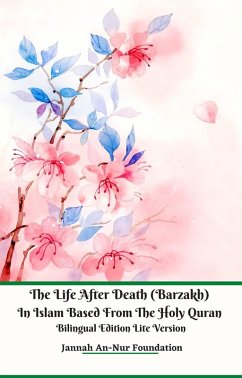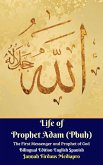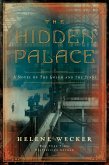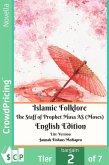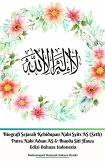The Life After Death (Barzakh) In Islam Based from The Holy Quran Bilingual Edition In English & Germany Languange Lite Version.
Barzakh is an Arabic word meaning "obstacle", "hindrance", "separation", or "barrier" designates a place separating the living from the hereafter; a veil between the dead and their return to world of the living, but also to a phase happening between death and resurrection.
Barzakh may, according to Ghazali, also be the place for those, who go neither to hell or to heaven. According to Ibn Hazm, Barzakh is also the place for the unborn souls, existing in the lowest heaven, where an angel blows the soul into wombs.
Mentioned only three times in The Holy Quran, and just once specifically as the barrier between the corporeal and ethereal, Barzakh is portrayed as a place in which, after death, the spirit is separated from the body - freed to contemplate the wrongdoing of its former life. Despite the gain of recognizance, it cannot utilize action. The other two occurrences refer to Barzakh as an impenetrable barrier between fresh and salt water. While fresh and salt water may intermingle, an ocean remains distinct from a river.
In hadith, Ibn al-Qayyim cites that, albeit not mentioned in the Quran, souls in Al-Barzakh would be grouped with others matching in purity or impurity. In Islam, the soul and the body are independent of each other. This is significant in Barzakh, because only a person's soul goes to Barzakh and not their physical body. Since one's soul is divorced from their body in Barzakh, the belief is that no progress or improvements to one's past life can be made. If a person experienced a life of sin and worldly pleasures, one cannot try to perform good deeds in order to reach Jannah Paradise.
Whatever one does in his or her lifetime is final and cannot be changed or altered in Barzakh. However, there is belief that the fire which represents the own bad deeds can already be seen in Barzakh, and that the spiritual pain caused by this can lead to purification of the soul. In Sufism the Barzakh or Alam-e-Araf is not only where the human soul resides after death but it is also a place that the soul can visit during sleep and meditation.
Barzakh ist ein arabisches Wort, das "Hindernis", "Hemmnis", "Trennung" oder "Barriere" bedeutet und einen Ort bezeichnet, der die Lebenden vom Jenseits trennt; ein Schleier zwischen den Toten und ihrer Rückkehr in die Welt der Lebenden, aber auch zu einer Phase, die sich zwischen Tod und Auferstehung abspielt.
Barzakh kann, so Ghazali, auch der Ort für diejenigen sein, die weder in die Hölle noch in den Himmel kommen. Nach Ibn Hazm ist Barzakh auch der Ort für die ungeborenen Seelen, die im untersten Himmel existieren, wo ein Engel die Seele in den Leib bläst. Im Koran wird Barzakh nur dreimal erwähnt, und nur einmal ausdrücklich als die Barriere zwischen dem Körperlichen und dem Ätherischen. Barzakh wird als ein Ort dargestellt, an dem der Geist nach dem Tod vom Körper getrennt wird - befreit, um über das Fehlverhalten seines früheren Lebens nachzudenken.
Trotz des Zugewinns an Anerkennung kann er sich keine Handlung zunutze machen. Die beiden anderen Vorkommnisse beziehen sich auf Barzakh als undurchdringliche Barriere zwischen Süß- und Salzwasser. Während Süß- und Salzwasser sich vermischen können, bleibt ein Ozean von einem Fluss getrennt.
Barzakh is an Arabic word meaning "obstacle", "hindrance", "separation", or "barrier" designates a place separating the living from the hereafter; a veil between the dead and their return to world of the living, but also to a phase happening between death and resurrection.
Barzakh may, according to Ghazali, also be the place for those, who go neither to hell or to heaven. According to Ibn Hazm, Barzakh is also the place for the unborn souls, existing in the lowest heaven, where an angel blows the soul into wombs.
Mentioned only three times in The Holy Quran, and just once specifically as the barrier between the corporeal and ethereal, Barzakh is portrayed as a place in which, after death, the spirit is separated from the body - freed to contemplate the wrongdoing of its former life. Despite the gain of recognizance, it cannot utilize action. The other two occurrences refer to Barzakh as an impenetrable barrier between fresh and salt water. While fresh and salt water may intermingle, an ocean remains distinct from a river.
In hadith, Ibn al-Qayyim cites that, albeit not mentioned in the Quran, souls in Al-Barzakh would be grouped with others matching in purity or impurity. In Islam, the soul and the body are independent of each other. This is significant in Barzakh, because only a person's soul goes to Barzakh and not their physical body. Since one's soul is divorced from their body in Barzakh, the belief is that no progress or improvements to one's past life can be made. If a person experienced a life of sin and worldly pleasures, one cannot try to perform good deeds in order to reach Jannah Paradise.
Whatever one does in his or her lifetime is final and cannot be changed or altered in Barzakh. However, there is belief that the fire which represents the own bad deeds can already be seen in Barzakh, and that the spiritual pain caused by this can lead to purification of the soul. In Sufism the Barzakh or Alam-e-Araf is not only where the human soul resides after death but it is also a place that the soul can visit during sleep and meditation.
Barzakh ist ein arabisches Wort, das "Hindernis", "Hemmnis", "Trennung" oder "Barriere" bedeutet und einen Ort bezeichnet, der die Lebenden vom Jenseits trennt; ein Schleier zwischen den Toten und ihrer Rückkehr in die Welt der Lebenden, aber auch zu einer Phase, die sich zwischen Tod und Auferstehung abspielt.
Barzakh kann, so Ghazali, auch der Ort für diejenigen sein, die weder in die Hölle noch in den Himmel kommen. Nach Ibn Hazm ist Barzakh auch der Ort für die ungeborenen Seelen, die im untersten Himmel existieren, wo ein Engel die Seele in den Leib bläst. Im Koran wird Barzakh nur dreimal erwähnt, und nur einmal ausdrücklich als die Barriere zwischen dem Körperlichen und dem Ätherischen. Barzakh wird als ein Ort dargestellt, an dem der Geist nach dem Tod vom Körper getrennt wird - befreit, um über das Fehlverhalten seines früheren Lebens nachzudenken.
Trotz des Zugewinns an Anerkennung kann er sich keine Handlung zunutze machen. Die beiden anderen Vorkommnisse beziehen sich auf Barzakh als undurchdringliche Barriere zwischen Süß- und Salzwasser. Während Süß- und Salzwasser sich vermischen können, bleibt ein Ozean von einem Fluss getrennt.
Dieser Download kann aus rechtlichen Gründen nur mit Rechnungsadresse in A, B, CY, CZ, D, DK, EW, E, FIN, F, GR, H, IRL, I, LT, L, LR, M, NL, PL, P, R, S, SLO, SK ausgeliefert werden.

